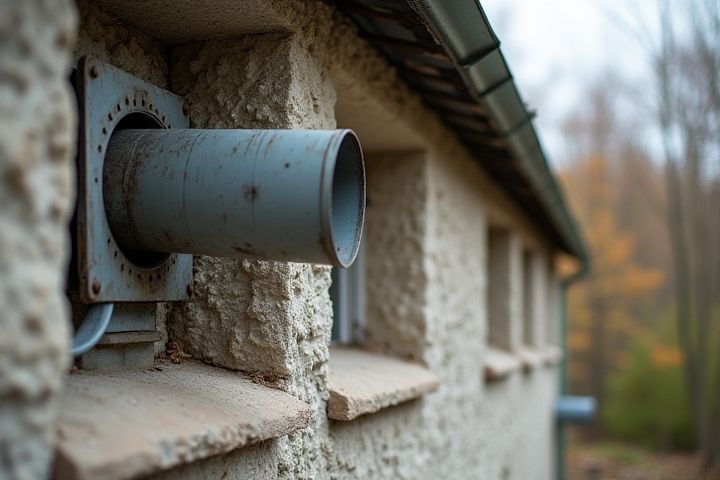
Proper ventilation in a house is essential to maintain indoor air quality and promote a healthy living environment. It helps to mitigate the buildup of moisture, which can lead to mold growth, structural damage, and health issues such as respiratory problems. Adequate airflow also aids in regulating temperature, making your home more comfortable and energy-efficient. Ventilation systems, whether natural or mechanical, allow for the exchange of stale indoor air with fresh outdoor air, reducing the concentration of pollutants, allergens, and odors. Ensuring effective ventilation is a key factor in safeguarding both the integrity of your home and the well-being of its occupants.
Why Does A House Need Ventilation
Reduces indoor air pollutants
Proper ventilation in a house is essential for reducing indoor air pollutants, such as volatile organic compounds (VOCs), mold spores, and dust mites. These pollutants can accumulate over time, leading to health issues such as respiratory problems, allergies, and headaches. By ensuring a steady flow of fresh air, you can dilute and remove these harmful contaminants, creating a healthier living environment. Implementing methods such as exhaust fans, air exchange systems, or simply opening windows can significantly improve air quality and promote overall well-being in your home.
Controls moisture levels
Ventilation is critical for maintaining optimal humidity levels in your home, which helps prevent mold growth and structural damage caused by excess moisture. Proper airflow removes stale, humid air and replaces it with drier, fresh air, effectively controlling indoor humidity. This process not only protects your home's integrity but also enhances indoor air quality, benefiting your health. By incorporating effective ventilation systems, you can ensure a healthier living environment and reduce the risk of moisture-related issues.
Prevents mold growth
Proper ventilation in a house is essential for preventing mold growth by regulating humidity levels. High humidity, often resulting from cooking, bathing, or poor air circulation, creates an ideal environment for mold spores to thrive. By allowing fresh air to circulate and damp air to escape, ventilation reduces moisture accumulation in critical areas such as bathrooms, basements, and attics. Installing exhaust fans and ensuring adequate airflow not only keeps your home healthier but also helps maintain its structural integrity by preventing mold-related damage.
Moderates indoor temperature
Ventilation is crucial in maintaining a moderate indoor temperature by facilitating the exchange of stale air with fresh outdoor air. This process helps reduce humidity levels, preventing the buildup of moisture that can lead to mold growth and structural damage. Proper airflow can also mitigate temperature fluctuations, keeping spaces cooler during hot months and warmer during colder seasons. By ensuring your home is well-ventilated, you enhance comfort and create a healthier living environment.
Provides fresh air exchange
Proper ventilation in a house facilitates fresh air exchange, crucial for maintaining a healthy indoor environment. This airflow helps dilute indoor pollutants, allergens, and excess moisture that can accumulate from cooking, cleaning, and daily activities. By introducing fresh outdoor air, ventilation reduces the risk of mold growth and prevents stale air from causing discomfort and respiratory issues. Ensuring your home has adequate ventilation not only enhances air quality but also contributes to overall well-being and comfort for you and your family.
Improves respiratory health
Proper ventilation in a house is essential for improving respiratory health by reducing indoor air pollutants, such as allergens, mold, and volatile organic compounds (VOCs). Effective airflow helps to dilute and disperse harmful particles, ensuring that the air quality remains safe and breathable. When your living space is well-ventilated, it minimizes the risk of respiratory issues, such as asthma and allergies, which can be exacerbated by stagnant air. Investing in ventilation systems or simply opening windows regularly contributes significantly to a healthier home environment and promotes overall well-being.
Enhances energy efficiency
Proper ventilation is crucial for enhancing energy efficiency in your home by regulating indoor temperature and reducing reliance on heating and cooling systems. Efficient airflow helps to maintain a consistent and comfortable atmosphere, minimizing energy consumption associated with temperature fluctuations. Effective ventilation prevents moisture accumulation that could lead to mold growth, preserving the integrity of your home's structure and reducing potential repair costs. By ensuring that fresh air circulates through your living spaces, you can rely less on mechanical climate control, ultimately lowering your energy bills.
Eliminates odors
A house requires proper ventilation to effectively eliminate odors that can accumulate from cooking, pets, and other activities. Stagnant air traps these unpleasant smells, leading to a musty or unwelcoming environment. Fresh air circulation helps to disperse unwanted scents, promoting a healthier atmosphere in your living space. Regular ventilation not only enhances comfort but also improves indoor air quality, making your home more enjoyable.
Protects structural integrity
Proper ventilation in your house is essential for protecting its structural integrity by preventing moisture buildup, which can lead to mold growth and wood rot. Effective airflow regulates humidity levels, reducing the risk of condensation and subsequently deterring damage to walls, insulation, and roofing materials. Ventilation systems, such as soffit vents and exhaust fans, promote a balanced environment that prolongs the lifespan of your home while maintaining indoor air quality. By ensuring adequate air circulation, you safeguard the structural components of your property against deterioration and costly repairs.
Increases overall comfort
A well-ventilated house enhances overall comfort by regulating indoor temperature and humidity levels, which can significantly affect your daily living experience. Effective ventilation systems, such as exhaust fans and air exchanges, help prevent the accumulation of stale air, thus reducing odors and improving air quality. By allowing fresh outdoor air to circulate, you can maintain a balanced environment that not only feels more pleasant but also promotes better health by minimizing allergens and pollutants. In fact, studies show that proper ventilation can lead to a 20% improvement in perceived indoor comfort, making it a crucial aspect of healthy living spaces.
